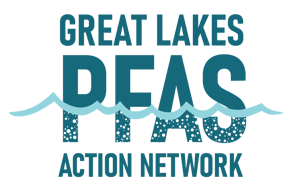
Proposed strong standards for key PFAS chemicals will protect health and drinking water of communities nationwide
LANSING - The Great Lakes PFAS Action Network issued the following statement applauding today’s announcement by the Environmental Protection Agency (EPA) of proposed national drinking water standards (Maximum Contaminant Limits or “MCLs”) for six PFAS chemicals: PFOA, PFOS, PFHxS, PFNA, PFBS, and GenX. These chemicals have been used in a wide variety of products and are the source of widespread contamination throughout the Great Lakes region and the rest of the country.
“The EPA’s proposed drinking water standards are an important milestone in the fight to protect public health and will save lives in impacted communities on the front lines of the PFAS crisis,” said Tony Spaniola, co-chair of the Great Lakes PFAS Action Network. “This is an A+ decision by the Biden Administration for front-line communities. We urge that the proposed drinking water standards be adopted and implemented with all deliberate speed.”
In 2016, the EPA set non-enforceable health advisories for PFOA and PFOS at 70 parts per trillion (ppt). Last year, in light of the growing understanding of the dangers of these chemicals, the EPA set updated advisories for PFOA and PFOS, which were near zero. The proposed limits for PFOA and PFOS are the lowest detectable levels with current detection methods, and EPA has proposed an ultimate MCL goal of zero for those two chemicals.
The proposed Maximum Contaminant Limits announced today are:
PFOA - 4.0 ppt
PFOS - 4.0 ppt
PFNA, PFHxS,PFBS, GenX - 1.0 Hazard Index
“These proposed drinking water limits are a strong step toward addressing the PFAS crisis and protecting our health not just in Michigan, but across the country,” said Sandy Wynn-Stelt, co-chair of the Great Lakes PFAS Action Network. “Importantly, these proposed limits send a strong message to polluters, especially industries that use these chemicals, that there is no such thing as a ‘safe’ amount.”
According to the Michigan PFAS Action Response Team (MPART), there are currently more than 200 confirmed PFAS contamination sites in the state of Michigan with more than 11,000 suspected PFAS sites throughout the state.
###
The Great Lakes PFAS Action Network is a coalition centered and driven by people impacted by toxic PFAS pollution and supported by the Michigan League of Conservation Voters Education Fund, Ecology Center, National Wildlife Federation, and Need Our Water (NOW), Oscoda. More information can be found at glpan.org.
WASHINGTON, DC – U.S. Senator Gary Peters (MI) released the following statement today applauding the Biden Administration’s announcement of a first-ever national standard to address toxic per- and polyfluoroalkyl substances (PFAS) in drinking water.
“After long pushing for a national standard to limit PFAS in drinking water, I applaud the Administration’s historic move that would improve public health and help ensure drinking water is clean and safe,” said Senator Peters, a member of the Senate Commerce, Science, and Transportation Committee. “Communities in Michigan have waited too long for action, and I urge the Administration to move swiftly in finalizing these new standards. I’ll keep fighting to address PFAS contamination, including to expedite PFAS clean-up efforts, and hold accountable the federal agencies responsible for remediation efforts to prioritize the health and safety of Michiganders — and all Americans.”
These actions build on Peters’ long-running efforts to address PFAS contamination. In September 2018, Peters helped convene the first-ever hearing on PFAS contamination in the Senate, which assessed the federal government’s response to PFAS contamination and remediation efforts. He then convened a field summit in Grand Rapids, Michigan in November 2018 to shine a light on how local, state and federal governments are coordinating responses to address PFAS contamination. Peters additionally convened a hearing as Chairman of the Homeland Security and Governmental Affairs Committee to examine how servicemembers, their families and communities across the country have been harmed by exposure to toxic PFAS substances connected to military sites. During the hearing, he raised the need to hold the Department of Defense (DoD) accountable for their failure to act. He also previously supported and led provisions in the national defense bill to prohibit DoD from purchasing or using firefighting foams containing PFAS chemicals for military training exercises, and enhanced state cooperation with DoD to clean-up PFAS contamination stemming from military-related activities.
Peters recently reintroduced the Federal PFAS Research Evaluation Act to help advance the federal government’s understanding of PFAS contamination. Peters’ bipartisan Preventing PFAS Runoff at Airports Act – which will deploy more existing Federal Aviation Administration (FAA) funding for commercial airports to purchase devices necessary to test their firefighting equipment without discharging toxic PFAS chemicals – was signed into law last year. In 2022, Peters’ bill to help protect firefighters and emergency responders from PFAS exposure in the line of duty was also signed into law.
In the most recent government funding bill signed into law, Peters pushed for continued efforts to address PFAS contamination. The law included $5 million for the Department of Agriculture to support efforts to address PFAS contamination in agriculture. It also included $2.7 million for the U.S. Geological Service to conduct research on the transmission of PFAS substances in watersheds and aquifers, and $2 million for the National Institute of Environmental Health Sciences to continue their work on PFAS and other contaminants of concern. Peters also helped secure funding for two local public projects in Oscoda Township and Marquette County that will help communities remediate and address longstanding issues with PFAS contamination. Peters also helped welcome $37 million in federal grants to address PFAS in drinking water made possible by the Bipartisan Infrastructure Law he helped enact.
###













